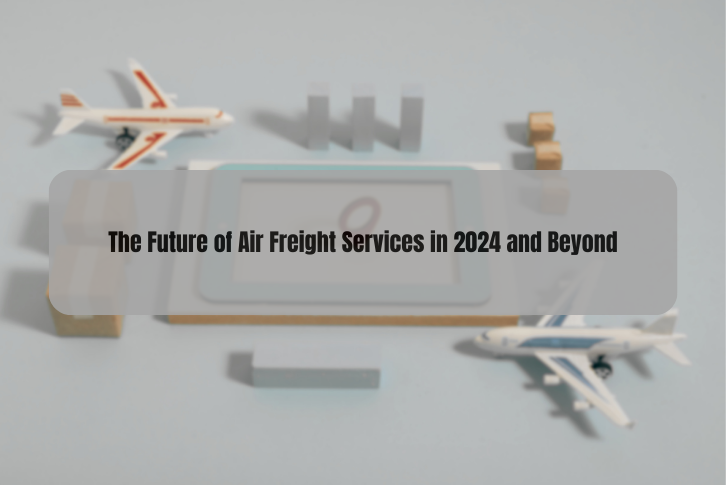Introduction
In the ever-evolving global economy, air freight services stand as a critical pillar, facilitating the swift and efficient movement of goods across borders. Looking forward to 2024 and beyond, the trajectory of air freight services promises to be shaped by a confluence of factors ranging from technological innovations to shifting trade dynamics and evolving consumer preferences.
1. Technological Advancements
- Drone Delivery: Unmanned aerial vehicles, or drones, have emerged as a disruptive force in the logistics industry. In air freight services, drones are revolutionizing last-mile delivery, particularly in remote or inaccessible areas. With their ability to navigate challenging terrains and deliver packages swiftly, drones offer a cost-effective and efficient alternative to traditional delivery methods.
- Blockchain Technology: Blockchain, with its decentralized and immutable ledger system, is transforming supply chain management. In air freight services, blockchain technology enhances transparency, traceability, and security throughout the shipment journey. By recording every transaction and document exchange in a tamper-proof manner, blockchain minimizes the risk of fraud, reduces paperwork, and streamlines customs clearance processes.
- Predictive Analytics: Leveraging big data and machine learning algorithms, predictive analytics empower air freight operators to forecast demand, optimize routes, and enhance operational efficiency. By analyzing historical shipping data, weather patterns, and market trends, predictive analytics enable companies to make informed decisions regarding capacity planning, resource allocation, and pricing strategies.
2. Shifting Trade Dynamics
- E-commerce Expansion: The exponential growth of e-commerce has significantly altered the landscape of global trade. With consumers increasingly demanding faster delivery times and seamless shipping experiences, air freight services have become indispensable for online retailers seeking to meet these expectations. As e-commerce continues to expand, air cargo operators are investing in advanced infrastructure and technology to handle the surge in demand for air freight services.
- Global Supply Chain Resilience: The COVID-19 pandemic underscored the importance of resilient supply chains capable of withstanding unforeseen disruptions. Air freight services emerged as a lifeline for essential goods, medical supplies, and personal protective equipment during the pandemic, highlighting their agility and flexibility. In response to the lessons learned from the pandemic, businesses are reevaluating their supply chain strategies and placing greater emphasis on diversification, redundancy, and risk mitigation measures.
- Trade Agreements and Regulations: Trade agreements, tariffs, and regulatory frameworks exert a significant influence on the flow of goods and services across borders. Air freight operators must stay attuned to changes in trade policies, customs procedures, and security regulations to ensure compliance and facilitate seamless cross-border movements. The harmonization of international standards and the adoption of digital customs clearance procedures are essential for streamlining trade processes and reducing administrative burdens on air cargo operators.
3. Changing Consumer Demands
- Sustainability Concerns: Environmental sustainability has emerged as a key consideration for consumers and businesses alike. In response, air freight operators are exploring eco-friendly initiatives such as the use of sustainable aviation fuels, carbon offset programs, and fleet modernization efforts. By reducing carbon emissions and minimizing their environmental footprint, air cargo companies can align with consumer preferences and contribute to global efforts to combat climate change.
- Demand for Transparency: In an era marked by heightened transparency and accountability, consumers are increasingly demanding visibility into the origins and journey of the products they purchase. Air freight operators are leveraging technology such as track-and-trace systems, real-time shipment monitoring, and electronic proof of delivery to provide customers with greater visibility and control over their shipments. Enhanced transparency not only fosters trust and loyalty but also enables proactive problem-solving and exception management.
- Customized Solutions: As supply chains become increasingly complex and diversified, there is a growing demand for customized freight solutions tailored to specific industry requirements. Air cargo operators are offering value-added services such as temperature-controlled shipping, perishable goods handling, and special cargo handling to meet the unique needs of various sectors, including pharmaceuticals, perishables, and high-value commodities. By providing tailored solutions and personalized experiences, air freight companies can differentiate themselves in a competitive market landscape.
Conclusion
The future of air freight services in 2024 and beyond is characterized by innovation, adaptability, and sustainability. Technological advancements such as drone delivery, blockchain, and predictive analytics are reshaping the industry landscape, enabling air cargo operators to optimize operations, enhance efficiency, and deliver superior customer experiences. Moreover, shifting trade dynamics and evolving consumer preferences are driving the need for agile, customer-centric solutions that prioritize transparency, sustainability, and flexibility. By embracing these trends and leveraging emerging technologies, air freight operators can navigate the complex and dynamic global logistics landscape with confidence, resilience, and foresight.



